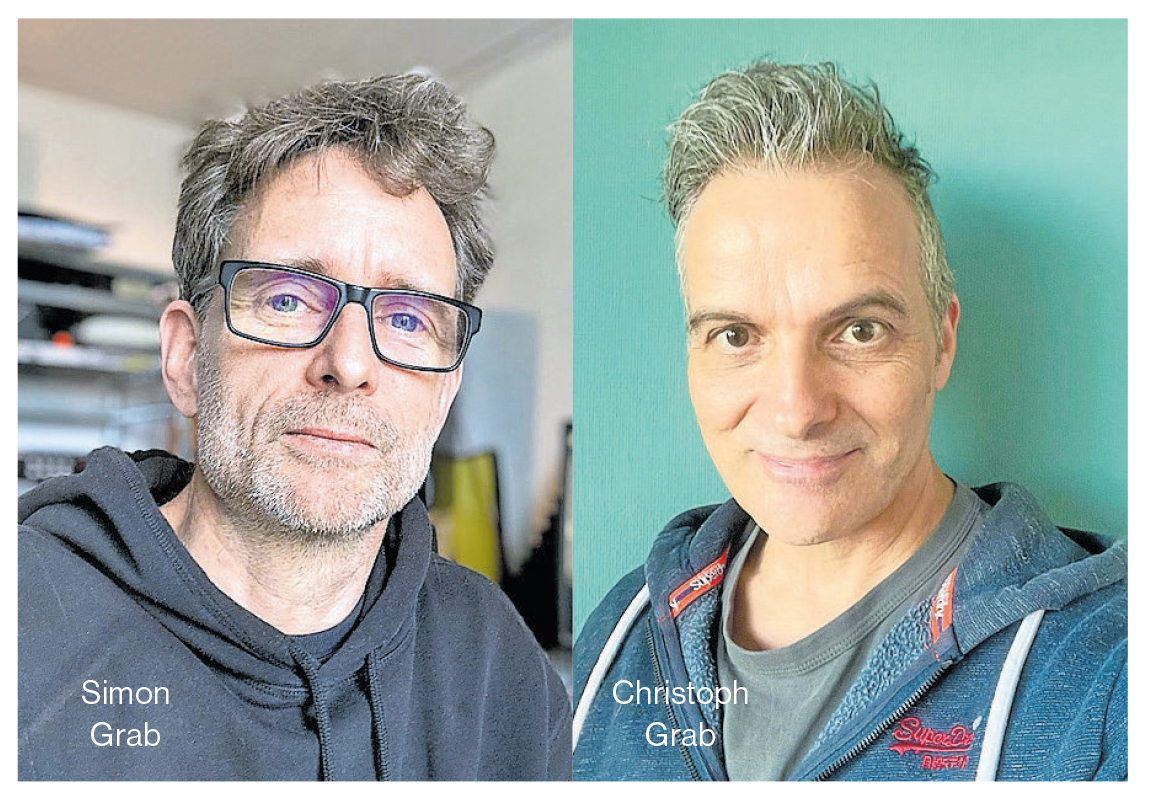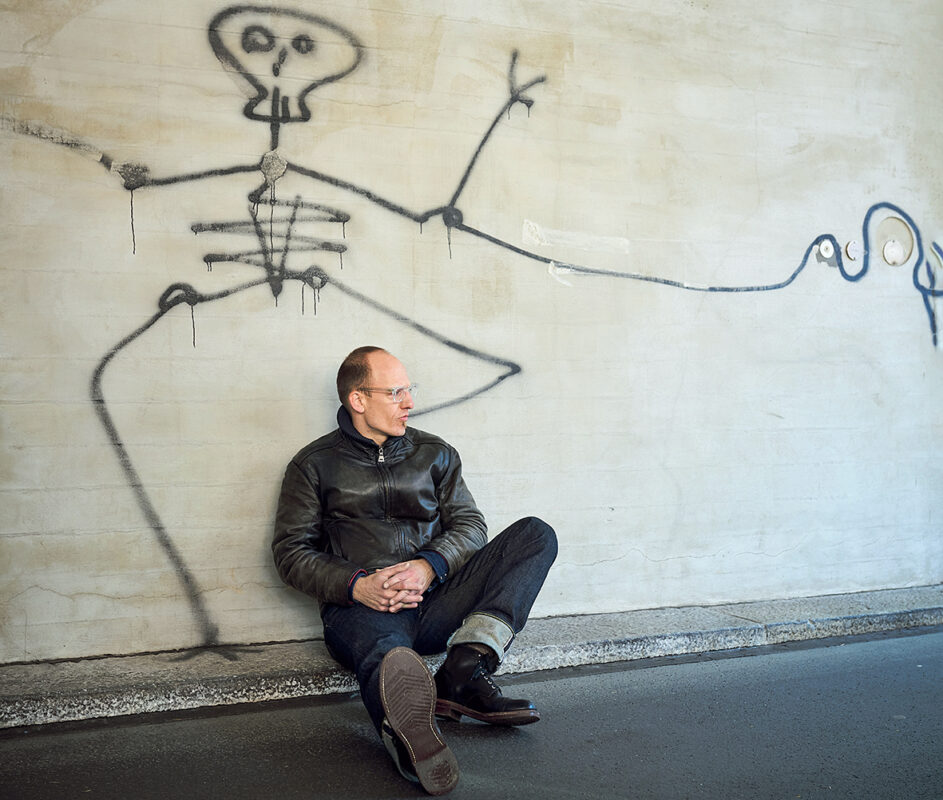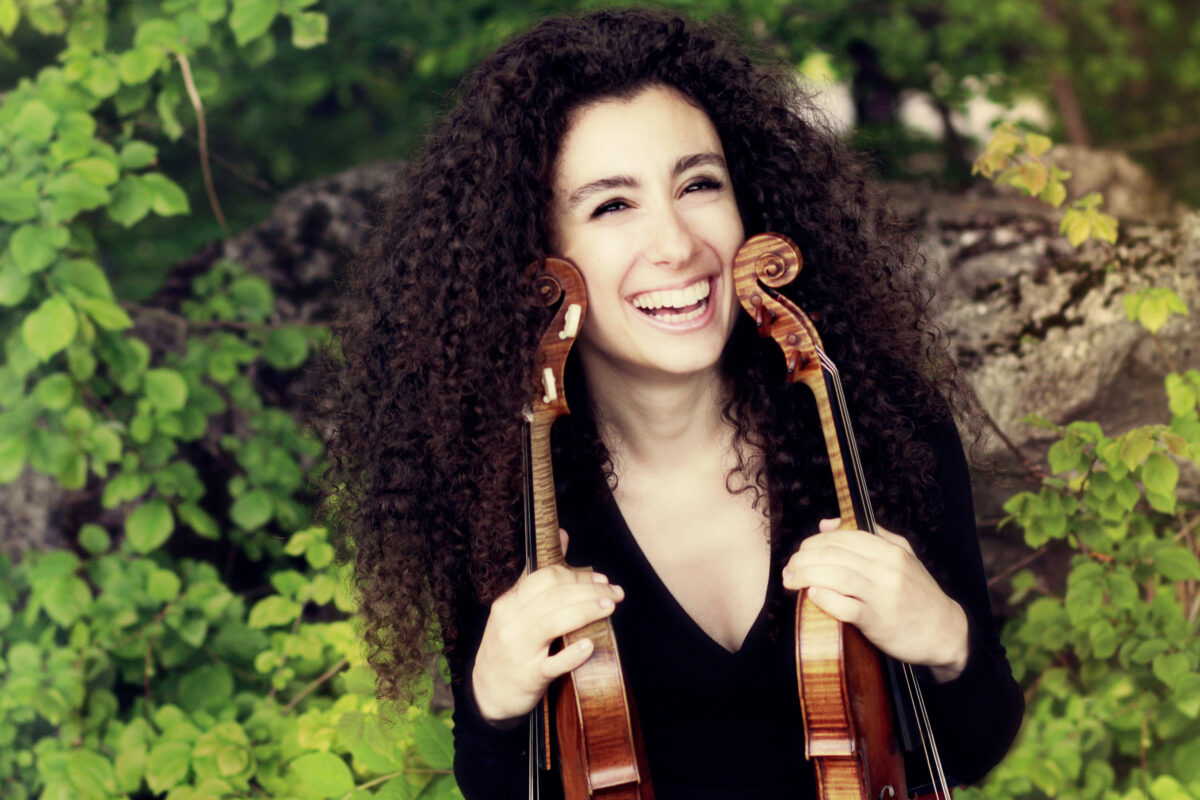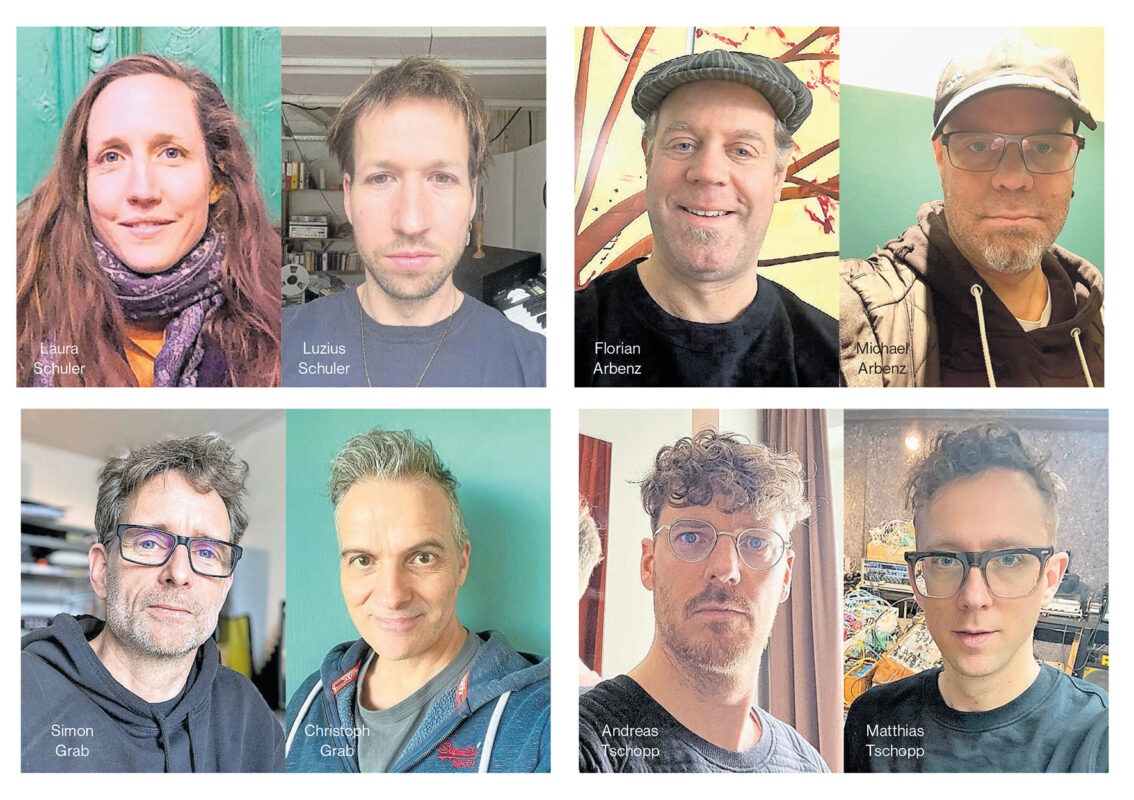Christoph & Simon Grab
Christoph, 1967, saxophone, composition
Simon, 1971, Noise, Souddesign

Hanspeter Künzler: What are you both doing at the moment?
CHRISTOPH I teach 2 ½ days at the ZHdK (Zurich University of the Arts). It's not my purpose in life, but I really enjoy doing it. It's a great basis for being free to make music afterwards. The interaction with the students is extremely inspiring. You get to hear a lot of things that you wouldn't otherwise. You can try things out with them and vice versa. You have your finger on the pulse of the jazz scene for 20 years. But I also have my own research and developments that are not related to the school.
I've just had a strong jazz phase, straighter. Now I'm starting to do more with electronics and loops again, which I used to do a lot. I have three bands of my own, Reflections, Root Area and Blossoms. I'm also part of the house quartet, but I don't have to organize anything for them. Then I also have a list of bands where I'm a sideman. My current priority is the new Reflections album.
SIMON I can also start with education, I've been at the ZHdK for a few years now, but I always taught on the side before that. I've always found that it's important to pass on knowledge immediately so that it's immediately renewed. That you don't sit on it so that it continues to play a part in the process. Now at the ZHdK, I'm less involved in creative music/sounds and more in audiovisual design, where I can pass on my passion for noise and sound and sound aesthetics.
Otherwise I'm mainly at home in electronics, but I also have a history of guitars and punk bands and other music. I got into experimental music very early on thanks to people like Joke Lanz, Dave Phillips and Rudolf Eb.er (sic). The whole Schimpfluch group opened a window to the world for me back then. Also through radio work, which they were always involved in. I'm currently working on solo pieces where I perform alone, as well as interdisciplinary projects with dance/film/whatever. Also with various musicians as duos and trios.
How did you grow up?
CHRISTOPH In the Zurich lowlands, Niederhasli. We both went to Bülach to the Kanti. There was a youth center in Niederhasli where you could make music.
SIMON Then we moved from the Zurich agglomeration to the countryside in Rafzerfeld, where the FDP is the far-left opposition.
Did you listen to music at home?
SIMON We sat in front of the speakers and recorded the hit parade on cassettes.
CHRISTOPH There was already music playing in the house. From light classical to ABBA and so on. My father played music all the time, especially the whistle. I asked myself where I got into improvising - as a jazz musician, that's my core business, what you do all the time. Then I remembered my father driving in the car, it was really annoying, he was always whistling, not things that were there, but looking for his own melodies. He played the trumpet, now the euphonium. He also played the didgeridoo and alphorn.
How did you get into jazz? In 1977 there probably weren't that many jazz fans at school?
CHRISTOPH No. I had a sax teacher who pushed me in that direction, improvisation. And there was the Big Band 71 in Niederhasli, older gentlemen who played great music to my ear, and I was allowed to play with them. That was a great experience. Later on, we had various bands at grammar school. I was always drawn to improvising. Why sax? I wanted to play the sax when I was 8 years old. I suppose it must have given me a kick somehow, but unfortunately I can't remember why.
You, Simon, learned to play the guitar to set yourself apart from your brother?
SIMON There was a guitar in the house and my mother played it. But there was a similar process. At first I always looked up to Christoph, he practiced a hell of a lot! Four years is a lot of time, a big age difference when you're that young. I learned classical guitar and once had a teacher who showed me how to improvise before I ended up with the electric guitar. I've always looked at what Christoph is doing. Especially Felix Utzinger, who he played with and who then became my guitar teacher. We played some funk fusion for a while, a strange style. For a while I was in a high school band with Nik Bärtsch and Kaspar Rast. But then I realized, hey, I have to do something else.
We were also socialized differently. The Bachenbülach youth center, autonomous and punk, suddenly made a lot more sense to me. Letting the energy out in a simple way, with the guitar. That you don't have to make it so complicated. But in retrospect, there was also the idea that I had to take a different path so that I wasn't always left behind. That was very formative.
You were ten years old, Christoph, when punk turned into new wave, but you were already in the waters of jazz and improvisation. Did that affect you at all?
CHRISTOPH Punk quite a bit, too. What we listened to a lot was dialect rock. Especially Frostschutz. I also wrote my own songs.
What were the first records you bought yourself?
SIMON I think I'm really into Elvis Presley ...
CHRISTOPH Yes, and I found that very funny. I never liked it.
SIMON I didn't have much idea what else was around. A bit of my brother's records.
CHRISTOPH For example, you once took over the hard rock phase from me, AC/DC ...
SIMON But nothing electronic. When I was 16 in high school, some people listened to a bit of house, the first raves: What, that even exists? That's when I found punk and hardcore for myself. I realized: there's so much. Before, it's a mystery to me how little access we had. Out in the countryside, you don't have the right magazines, and the radio only played nonsense.
CHRISTOPH For me it was the dialect thing, I had a lot of stuff. Before that, Mani Matter, we listened to that one record to death. I remember buying a record by Urs Blöchlinger very early on because Chrigel Rentsch had written something in the newspaper. At first I thought the music was really weird, but later I found it interesting. I think it was important that I had the record before anything else, before Charlie Parker and so on.
Was it important to see that a Swiss man could make such a record?
CHRISTOPH Yes. My first record was probably something like AC/DC. Probably High Voltage.
One 18, the other 14, a big gap indeed. Was there a moment when you started talking about music?
SIMON Not for a very long time. There was a brief moment when I had the band with Nik and Kaspar, and you came to jam with us a few times. Not for years after that. We didn't see each other regularly either, even though we both lived in Zurich. We were in completely different places musically.
CHRISTOPH It was a time when I wasn't doing much jazz at all, but mainly free music and electronics with a neuro-modulator. We were actually doing similar things. I was very much into electronic music and oriented myself a lot towards things like Aphex Twin. That was a bit later, at the end of the 90s.
SIMON I started experimenting with sound on Radio LoRa in 1994. There was - and still is - an open format for sound experiments of all kinds. Sunday evenings at 9 pm. A lot happened for me during that time. I started cutting tapes, making music with Atari, live radio experiments, mixing stuff together from the mixing desk. Also the time when I opened the door to jungle and drum'n'bass in London. That got me completely involved in electronics. I came to electronics through experimentation, sort of from the new music of the 50s and 60s, where it was all about sound experiments, those were the influences for the radio stuff. The tape recorder as an instrument. Pretty soon you come to effects units. Via Dub then, of course, to the mixing console. The mixing console is still the focus.
CHRISTOPH Interesting! I always came to electronics via instrumental music. In contrast to Simon, who was often alone, always in bands. We got together, played, and everyone had their devices with them and researched how we could connect.
SIMON And us: How can you construct electronic tracks in a club context? The Bunte Welt der Zimmerpflanzen was a drum'n'bass duo that played tracks with samples. Fragments that were used to build tracks.
CHRISTOPH Funnily enough - that's where Simon inspired me - at some point, after I had been working with electronics for some time, I started to open up some devices, for example old Casio keyboards, solder them together and try to make sound machines out of them. Once I even had a band, Toy Band, where three people played around on my machines. I still have three boxes, big ones, with the machines. That must have been an inspiration from Simon.
How did you make the leap from Elvis to electronics?
SIMON Elvis was a child's thing, then puberty, then you change your orientation. That was relatively quick, after 12, 13. I think the youth center came at 15. Ironically, I was in Detroit for an exchange year in 1989/90. The family lived in the suburbs. In retrospect, I found out that this whole techno thing was going on in Detroit at the time! I had heard about it, but I wasn't allowed to go into the city. Too dangerous, too black.
Interesting, both of you have not accepted that the limitations of normal instruments mark the boundaries of music creation.
CHRISTOPH The desire to break out, to look for something different, was there for me from the very beginning, even before electronics. I combined a lot of 12-tone composition and improvisation. The band was called Nadelöhr, later Koi. We experimented a lot, away from the normal. That already started during jazz school.
Did you inherit the rebellious spirit from your parents?
SIMON I have the feeling, even though they grew up in the 50s/60s, that they weren't very rebellious. They didn't take part in the movements of the time either. At best, they took something from the newer forms of education. Anti-authoritarian upbringing was incorporated a little, but not explicitly. The mother was a clerk, very much at home, the father in aroma research. Givaudan. Food flavors.
CHRISTOPH That must have been something - he passed on the explorer gene!
SIMON And we inherited more of a sense of community, the need to be together, from our mother.
There were still phases between you where you talked more about music, maybe even had a band together?
SIMON We played together, but very rarely. That was always very cool. But we never had a band. There might still be a duo of brothers one day.
Simon, the first sentence on your homepage is: "Celebration of the Error." What do you think of that, Christoph?
CHRISTOPH Well, if I relate it to my electronic stuff and experiences, it's something I totally understand. With my devices, I've tried to create errors, unstable states and so on. Experimental electronics is often about that. In jazz they often say: there are no errors. It's similar in that sense. You can do what you think is right. But I wouldn't apply the "Celebration of the Error" formula to jazz so directly. Rather: be yourself, and that's a good thing.
SIMON Of course, that's what it means. It's not about looking for mistakes and then focusing on them. It's about taking technology as an open instrument with which you can do what you want, create what you want. That's a very similar statement to the one Christoph just made. "Celebration of the Error" is the liberation from machine thinking as a closed state, as something that you have to use in a certain way, that you have to mix. Certain sound engineers would go for my throat about certain things. But breaking conventions brings new impulses.
In my generation, people often say: Today, everything comes from the computer, that's not music anymore. Your generation, and even more so those after you, have gotten used to it, completely accepted the computer, haven't they?
SIMON There is a 100-year tradition of noise that goes back to the Futurists. The Futurists made noise instruments that imitated urban sound environments. They made industrialization audible. However, this was ignored for a long time or remained stuck in the elitist sphere. That changed with electronic music at the beginning of the 70s. We grew up with synthesizers.
CHRISTOPH After my first electronic phase, I became much more interested in things that a synth can never do. Any instrument with a person behind it can sound 1000 times more diverse and subtle than any synth. But I still carry the awareness of sound that I experienced with electronic music with me now.
When did you switch to the professional camp?
SIMON I had an amateur approach. I studied sociology and education and set up a recording studio alongside my studies. Once it was up and running, we started with theater productions, performances and film. Because we had to earn money, it automatically went from zero to one hundred. It was set up professionally right from the start. That was in 1996 and the studio is still called Ganzerplatz. We currently have two separate studios. Before there were three of us. Now we work independently, but still under one roof. My studio partner mainly does film post-production. I then said goodbye to commissioned work, especially advertising. That was well financed in the 90s. Then I had a break with a car accident. I thought: what do I want to do with my life? Not advertising! I did less film music for a long time, but now I'm doing a bit again. Today I get asked about the music, what I want to do with it, not about commissioned work.
CHRISTOPH I would have liked to work professionally back in high school. But I let myself be pressured into studying to be a teacher. After a year, I dropped out and went to the jazz school in Bern. After my studies, it worked out, a bit of teaching, as much playing as possible, the usual mix in Switzerland.
Simon, you often work with musicians from other countries, not least from Africa. How did this "globalization" come about?
SIMON At the end of the 90s, a singer from Côte d'Ivoire, Math Doly, came into the studio and thought he would like to record something. Everything went very slowly, but at some point we did it and recorded an album. We went to Côte d'Ivoire with it and promoted it. From then on, I was in West Africa all the time, especially in winter. First with Math Doly in Côte d'Ivoire, where I heard urban electronic music for the first time in Abidjan. Later, I went to Ouagadougou with a theater group, where I got to know the local hip-hop scene. Ouagadougou has always been a melting pot of different African musicians. This gave me access to urban music from the African continent. I discovered Kuduro from Angola very early on.
I'm a digger, I'm always digging for music. So I founded the Motherland collective with other people from Zurich (note on the homepage: "Motherland is a collective that presents urban sounds and living environments from African metropolises as well as African-influenced sounds and living environments from all over the world in the city of Zurich.") and joined Norient (Network for local and global sounds and media culture).
Many thanks for the chat, croissants and coffee!








